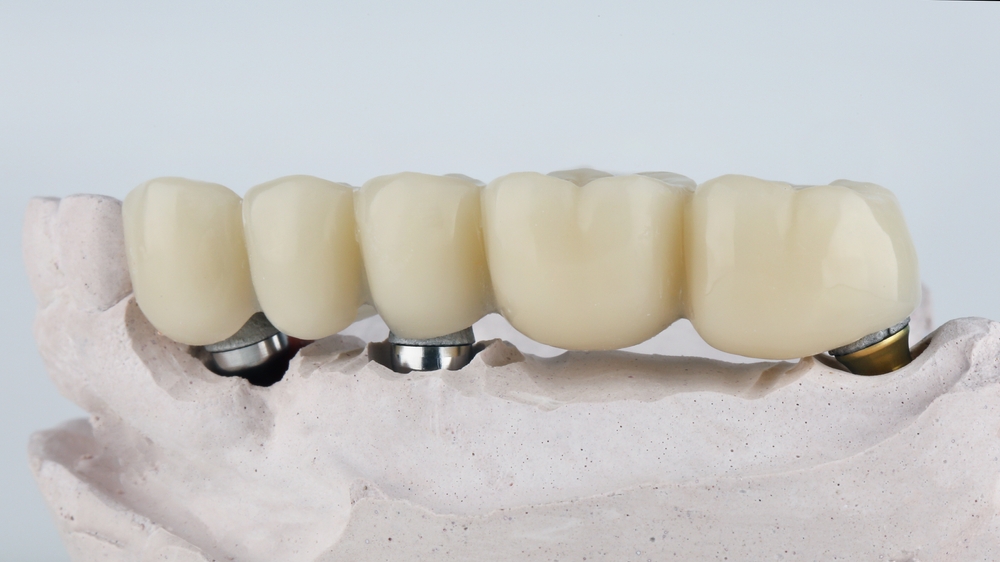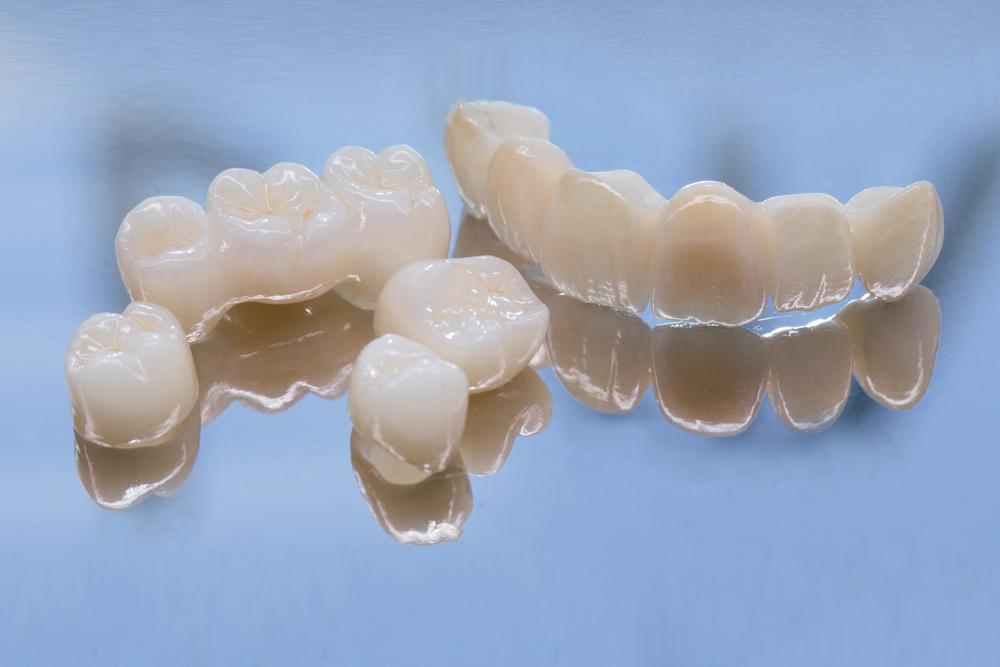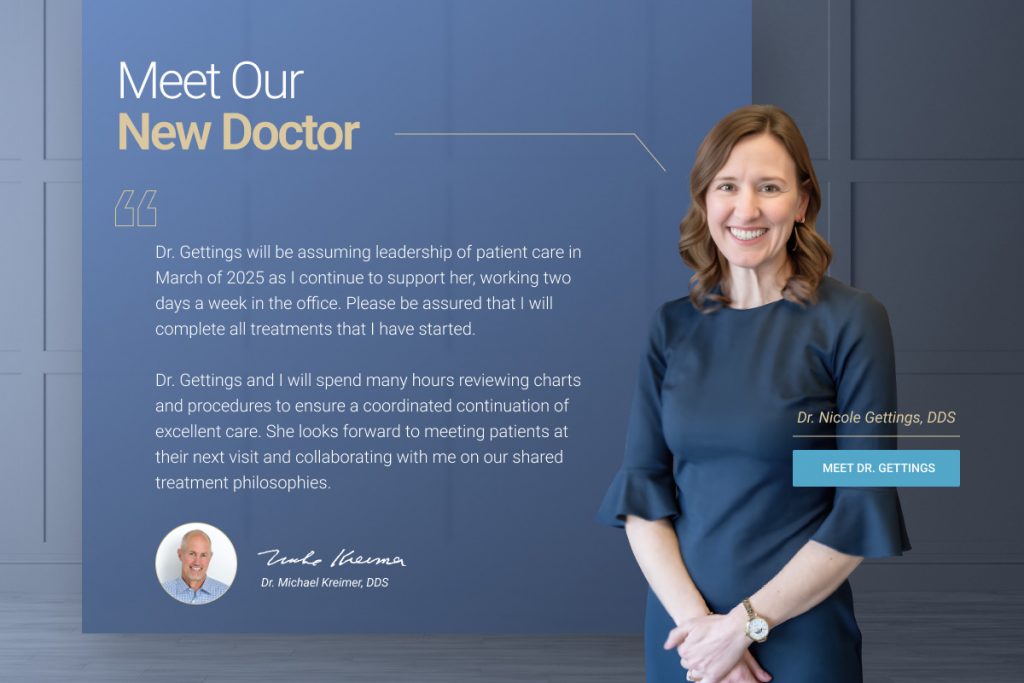Restore Multiple Missing Teeth with Advanced Dental Solutions
Missing several teeth affects your ability to eat, speak, and smile with confidence. At Michael Kreimer, DDS, we provide implant-supported bridges as a permanent solution for multiple missing teeth. These advanced restorations combine the stability of dental implantswith the comprehensive coverage of traditional bridges. Call our Loveland dental officeat (513) 677-3656to learn how implant-supported bridges can restore your complete, natural-looking smile.
What are Implant-Supported Bridges?
Implant-supported bridgesreplace multiple missing teeth using dental implants as anchors. Unlike traditional bridges that rely on natural teeth for support, these restorations attach directly to titanium implant posts placed in your jawbone.
Four Essential Components
- Titanium Posts: Surgical-grade implants that integrate with your jawbone
- Abutments: Metal connectors that attach to the implant posts
- Porcelain Crowns: Custom-made caps that cover the abutments
- Pontic Teeth: Replacement teeth connected between the crowns

Types of Implant-Supported Dental Bridges
Several options exist for implant-supported restorations:
- Fixed Bridges: Permanent attachments that function like natural teeth
- Removable Bridges: Can be removed for cleaning and maintenance
- Full-Arch Bridges: Replace all teeth in the upper or lower jaw
- Partial-Arch Bridges: Replace several consecutive missing teeth
- Hybrid Bridges: Combine fixed and removable features
Benefits of Implant-Supported Bridges
These advanced restorations offer multiple advantages:
- Permanent Solution: Long-lasting tooth replacement
- Bone Preservation: Implants stimulate natural bone growth
- Protected Natural Teeth: No modification of adjacent teeth is needed
- Improved Function: Restored ability to eat and speak naturally
- Enhanced Stability: No slipping or movement
- Natural Appearance: Matches your existing teeth
- Better Oral Health: Prevents additional tooth loss
Advanced Treatment at Our Loveland Practice
Dr. Kreimer brings over 30 years of dental experience to every procedure. Our practice combines this experience with state-of-the-art technology for precise implant placement. Schedule your consultation today at (513) 677-3656to learn about our advanced approach to implant-supported bridges.
IV Sedation for Maximum Comfort
As an IV sedation-certified dentist, Dr. Kreimer provides advanced comfort options during implant placement. This qualification helps anxious patients receive necessary care comfortably.

The Treatment Process
Initial Consultation
We begin with a comprehensive evaluation of your oral health, including detailed 3D imaging to assess bone structure and plan implant placement.
Treatment Planning
Using advanced imaging technology, we determine optimal implant locations and create your personalized treatment plan.
Implant Surgery
We place your dental implants using precise surgical techniques. Dr. Kreimer’s IV sedation certification allows us to offer maximum comfort during this procedure.
Healing Period
Over three to six months, your implants integrate with your jawbone. We monitor your progress through regular check-ups.
Final Restoration
Once healing is completed, we attach your custom-made dental bridge to the implants, creating your new, stable smile.
Candidates for Implant-Supported Bridges
Ideal candidates include:
- People missing multiple consecutive teeth
- Those with adequate jawbone density
- Patients with good oral health
- Non-smokers
- Individuals without uncontrolled medical conditions
Some patients may need bone grafting before implant placement. We can discuss these options during your consultation.
Investment in Your Oral Health
Several factors influence the cost of implant-supported bridges:
- Number of implants required
- Type of restoration materials
- Additional procedures if needed
- Geographic location
- Treatment complexity
We work with multiple insurance providers and offer financing options to help make treatment accessible.
 Post-Treatment Care
Post-Treatment Care
Maintaining your implant-supported bridge requires:
- Regular brushing and flossing
- Professional cleanings every four to six months
- Following specific care instructions
- Regular dental check-ups
Frequently Asked Questions
How long do implant-supported bridges last?
With proper care, implant-supported bridges can last 15 to 20 years or longer. The implants themselves often last a lifetime, while the bridge portion may need replacement after 10-15 years due to normal wear. Regular dental visits and good home care significantly extend their lifespan.
How many teeth can an implant-supported bridge replace?
An implant-supported bridge typically replaces two to six consecutive missing teeth. The number of implants needed depends on the span of the bridge and your bone structure. Larger spans may require additional implants for proper support.
Is the procedure painful?
The surgery occurs under appropriate anesthesia, keeping you comfortable throughout. Some mild discomfort may occur during recovery, but this typically resolves within a few days and responds well to over-the-counter pain medication.
What’s the difference between traditional and implant-supported bridges?
Traditional bridges rely on natural teeth for support, requiring modification of healthy teeth. Implant-supported bridges anchor directly to your jawbone through dental implants, preserving your natural teeth while providing superior stability.
How do I care for my implant-supported bridge?
Care includes regular brushing, flossing with special tools, and professional cleanings. Your dentist will provide specific instructions for maintaining your restoration. Regular check-ups help monitor the health of your implants and bridge.
Transform Your Smile with Implant-Supported Bridges Today
Take the first step toward a complete, confident smile. Dr. Kreimer and our dedicated team welcome patients from Mason, Montgomery, and Milford areas to our Loveland, OH practice. Contact us(513) 677-3656to schedule your consultation and learn how implant-supported bridges can restore your quality of life.



